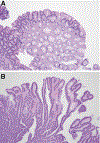Colorectal Cancer in Inflammatory Bowel Disease: Mechanisms and Management
- PMID: 34757143
- PMCID: PMC9003896
- DOI: 10.1053/j.gastro.2021.10.035
Colorectal Cancer in Inflammatory Bowel Disease: Mechanisms and Management
Abstract
Patients with inflammatory bowel disease (IBD) are at increased risk of developing colorectal cancer (CRC), despite decreases in CRC incidence in recent years. Chronic inflammation is the driver of neoplastic progression, resulting in dysplastic precursor lesions that may arise in multiple areas of the colon through a process of field cancerization. Colitis-associated CRC shares many molecular similarities with sporadic CRC, and preclinical investigations have demonstrated a potential role for the microbiome in concert with the host immune system in the development of colitis-associated colorectal cancer (CAC). Some unique molecular differences occur in CAC, but their role in the pathogenesis and behavior of inflammation-associated cancers remains to be elucidated. Nonconventional types of dysplasia have been increasingly recognized, but their natural history is not well defined, and they have not been incorporated into surveillance algorithms. The concept of cumulative inflammatory burden highlights the importance of considering histologic inflammation over time as an important risk factor for CAC. Dysplasia is arguably the most important risk factor for developing CAC, and advances have been made in the endoscopic detection and removal of precancerous lesions, thereby deferring or avoiding surgical resection. Some of the agents used to treat IBD are chemopreventive. It is hoped that by gaining better control of the underlying inflammation with newer medications and better endoscopic detection and management, a more sophisticated appreciation of clinicopathologic risk factors, and growing awareness of the genetic, immunologic, and environmental causes of colitis- associated neoplasia, that colitis-associated colorectal neoplasia will become even more predictable and manageable in the coming years.
Copyright © 2022 AGA Institute. Published by Elsevier Inc. All rights reserved.
Figures



References
-
- Lopez A, Pouillon L, Beaugerie L, Danese S. & Peyrin-Biroulet L. Colorectal cancer prevention in patients with ulcerative colitis. Best Pract. Res. Clin. Gastroenterol. 32–33, 103–109 (2018). - PubMed
-
- Farraye FA, Odze RD, Eaden J. & Itzkowitz SH AGA technical review on the diagnosis and management of colorectal neoplasia in inflammatory bowel disease. Gastroenterology 138, 746–74, 774.e1 (2010). - PubMed
-
- Lutgens MWMD et al. Declining risk of colorectal cancer in inflammatory bowel disease: an updated meta-analysis of population-based cohort studies. Inflamm. Bowel Dis. 19, 789–799 (2013). - PubMed
-
- Jess T, Gamborg M, Matzen P, Munkholm P. & Sørensen TIA Increased risk of intestinal cancer in Crohn’s disease: a meta-analysis of population-based cohort studies. Am. J. Gastroenterol. 100, 2724–2729 (2005). - PubMed
-
- Jess T, Horváth-Puhó E, Fallingborg J, Rasmussen HH & Jacobsen BA Cancer risk in inflammatory bowel disease according to patient phenotype and treatment: a Danish population-based cohort study. Am. J. Gastroenterol. 108, 1869–1876 (2013). - PubMed
Publication types
MeSH terms
Grants and funding
LinkOut - more resources
Full Text Sources
Other Literature Sources
Medical

